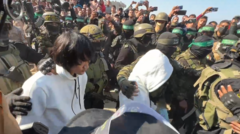The United Nations Security Council convenes as Israel's planned restrictions threaten humanitarian aid for millions of Palestinians in Gaza and the West Bank.
Israel Faces International Pressure Over Ban on Palestinian Refugee Aid Agency

Israel Faces International Pressure Over Ban on Palestinian Refugee Aid Agency
Diplomats Urge Israel to Reconsider Decision Affecting UNRWA Amid Unfolding Humanitarian Crisis
In a critical meeting of the United Nations Security Council, held just two days before Israel is set to impose a ban on operations of the United Nations Relief and Works Agency (UNRWA), global diplomats have voiced strong opposition to the measure. The agency, critical in providing humanitarian assistance to over two million Palestinians in Gaza, has recently come under fire as a fragile ceasefire is enforced in the region.
During Tuesday’s session, officials from the UN and the majority of the Security Council members condemned the potential legislation, asserting that it breaches international law and the United Nations charter. They highlighted the significant adverse effects these restrictions would have on aid delivery and the long-term peace process. Philippe Lazzarini, chief of UNRWA, remarked, “The legislation makes a mockery of international law and imposes massive constraints. We are determined, however, to stay and deliver until it is no longer possible to do so."
In stark contrast, the United States stood as Israel’s sole supporter during the discussions. Dorothy Shea, the U.S. representative, downplayed the agency’s concerns, labeling the claims of disproportionate impact as "exaggerated" and urged observers to consider Israel's "sovereign decision" to close the agency's offices within its borders.
The repercussions of this impending ban continue to raise alarm not only within the region but across the international community, as stakeholders call for a reassessment of policies that jeopardize humanitarian aid for vulnerable populations.
During Tuesday’s session, officials from the UN and the majority of the Security Council members condemned the potential legislation, asserting that it breaches international law and the United Nations charter. They highlighted the significant adverse effects these restrictions would have on aid delivery and the long-term peace process. Philippe Lazzarini, chief of UNRWA, remarked, “The legislation makes a mockery of international law and imposes massive constraints. We are determined, however, to stay and deliver until it is no longer possible to do so."
In stark contrast, the United States stood as Israel’s sole supporter during the discussions. Dorothy Shea, the U.S. representative, downplayed the agency’s concerns, labeling the claims of disproportionate impact as "exaggerated" and urged observers to consider Israel's "sovereign decision" to close the agency's offices within its borders.
The repercussions of this impending ban continue to raise alarm not only within the region but across the international community, as stakeholders call for a reassessment of policies that jeopardize humanitarian aid for vulnerable populations.























